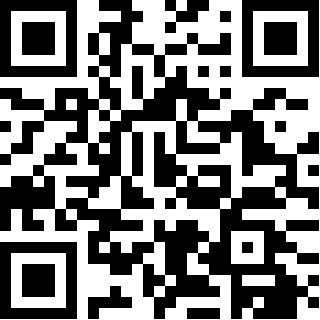Thinkladder
Improving inner-wellness in small, meaningful ways everyday

Prepared by Dulantha Peiris
Investment - 10 July 2023
Problem
Even the smallest worries can impact our day or the season we are in.
When safe and supportive friends are not always readily available, and professional help may seem out of reach, many of us face the daunting challenge of navigating our inner thoughts and concerns alone.
Solution
Thinkladder enables small, positive changes in practical ways that are meaningful, fun and easy.
Grounded in five years of research, Thinkladder leverages technology and AI to safely solve the single specific problem of Cognitive Restructuring, empowering individuals and organisations to be healthier and more productive everyday.
Cognitive Restructuring gives us the power to re-train our thoughts to improve inner-wellness

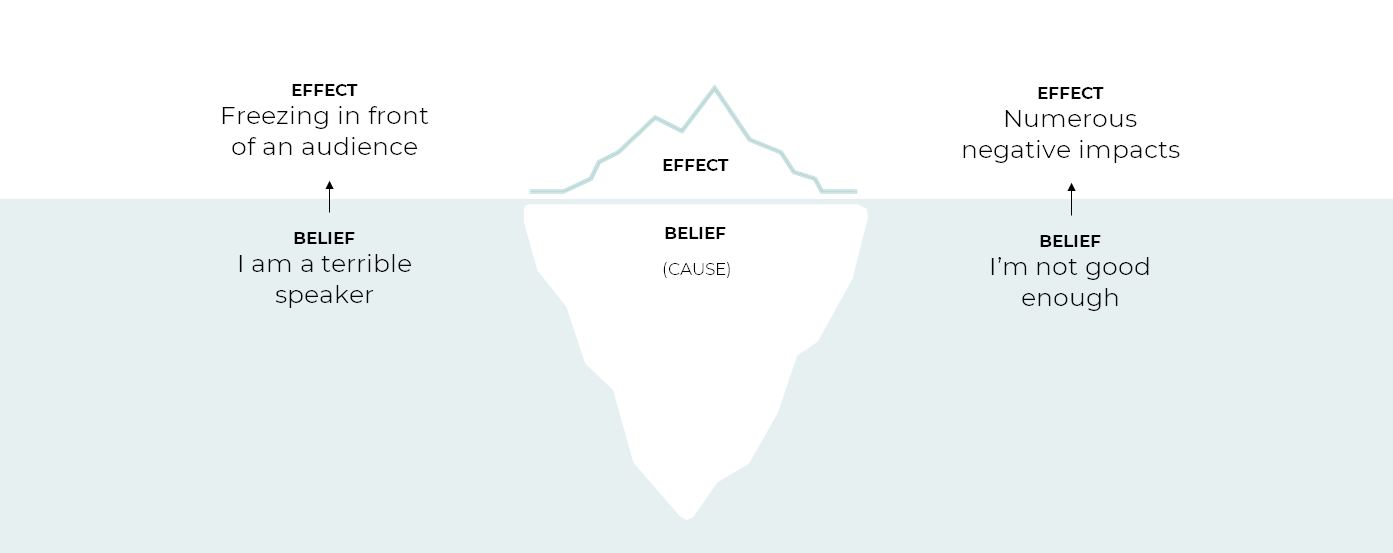

Thinkladder turns Cognitive Restructuring into a beautiful, simple and personal experience.
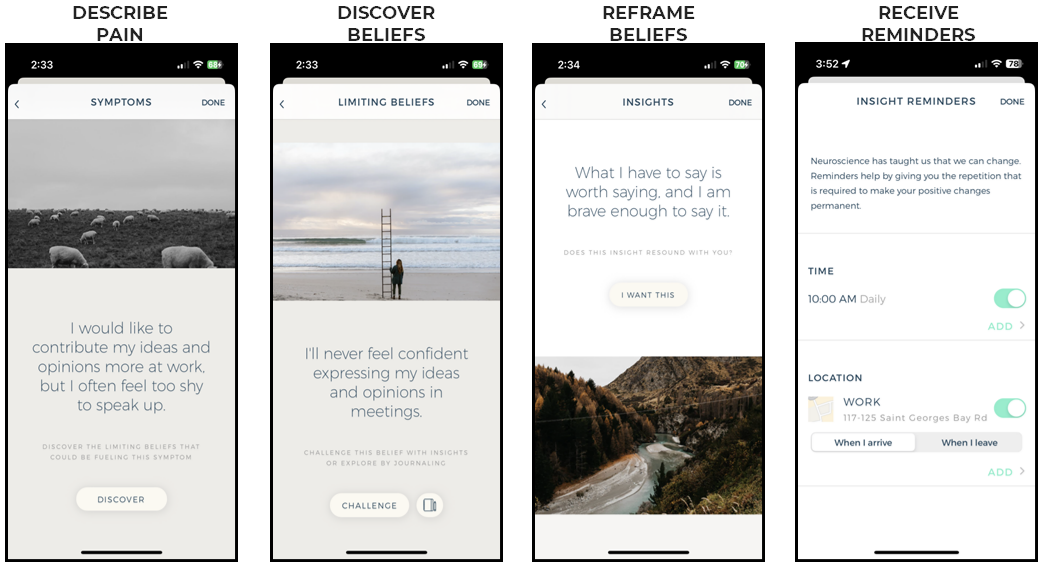
Thinkladder is available as a Mobile App, a Slack App and also via APIs (for easy addition into other apps) making Cognitive Restructuring accessible wherever people already live and work.
Thinkladder Cognitive Restructuring Works.

Market
Grounded in science and the personal experience of thousands of users (and validated by therapists), we are now positioned to scale.
Our vision is to reach EVERYONE with a Smartphone or Internet connection and help them to be happier and healthier every day.

Our TAM (Total Addressable Market) is all of connected humanity, anyone who can reach us via a smartphone or a web-browser.
The SAM (Serviceable Addressable Market) for now, is the English-speaking subset of the TAM who are aged 12+ with normal cognitive abilities, ideally with access to a Smartphone.
The SOM (Serviceable Obtainable Market) that we are focussed on is centred around the mindset of personal-development and self-improvement. We target the communities, organisations, workplaces where this type of mindset is valued and encouraged.
Our focus is the Personal Growth and Development market where individuals and communities value inner-wellness.
Thinkladder provides targeted cognitive reframing experiences to communities where personal growth and development, self-awareness and self-improvement are valued, because meaningful engagement is natural in these communities.
The partnership verticals we will focus on initially are Education, High Performance Sport, Therapists, Youth Workers, Executive Coaches, Trainers and Corporate Wellbeing.
At the consumer level we are leveraging the lived-experience of "community cohorts" to help rapidly generate and validate themes based on specific needs and also accelerate viral distribution. Examples of cohorts include, therapists, athletes, farmers, students, returnees to work, and the fashion industry.
"Competitive" Landscape

Talkspace, BetterHelp, Wysa, Woebot, Headspace, Calm and Insight Timer are some well known names in the inner-wellbeing space.
The wellbeing market can be served in many ways, ranging from expensive highly personal services, to generic, low-cost tools designed for volume sales.
Thinkladder seeks to carve out a new space by combining highly personalised experiences with the ability to massively scale at low cost (leveraging ML and AI on top of massive proprietary datasets).
Our approach over 4 years has been to work with therapists to create and validate safe, easy to use and engaging tools and content in the app with the help of tens of thousands of users.
Thinkladder is now transitioning these tools for use in third party apps and platforms like Slack, specialist HR, or education software which already have customers and distribution.
While the Thinkladder app experience is powerful, we intentionally play well with others.
Calm and Headspace represent recognised brands with highly developed, successful practices with a Cost to Acquire Customers (CAC) of close to $50 per user.
While Thinkladder has its own app and practices (and will develop these further), our goal is not to replicate these models. Instead, Thinkladder offers deeply personalised wellbeing experiences as a platform that can be deployed with a few snippets of code - like Stripe, for well-being.
While a Calm and Headspace level CAC might be $50, the target CAC for Thinkladder is less than 1% of that (at ~50c). This enables exceptional economic flexibility for pricing, and scalability.
While Thinkladder can make transformational impacts to reducing stress for consumers, we've identified that the personal growth and development market, particularly outcome focused professionals, including therapists, athletes, and educators etc, represent higher value opportunities that can be targeted.
Profitwell, in the chart below shows that willingness to pay for athletic or professional performance is 2x to 3x greater than overall health, relationships or stress.
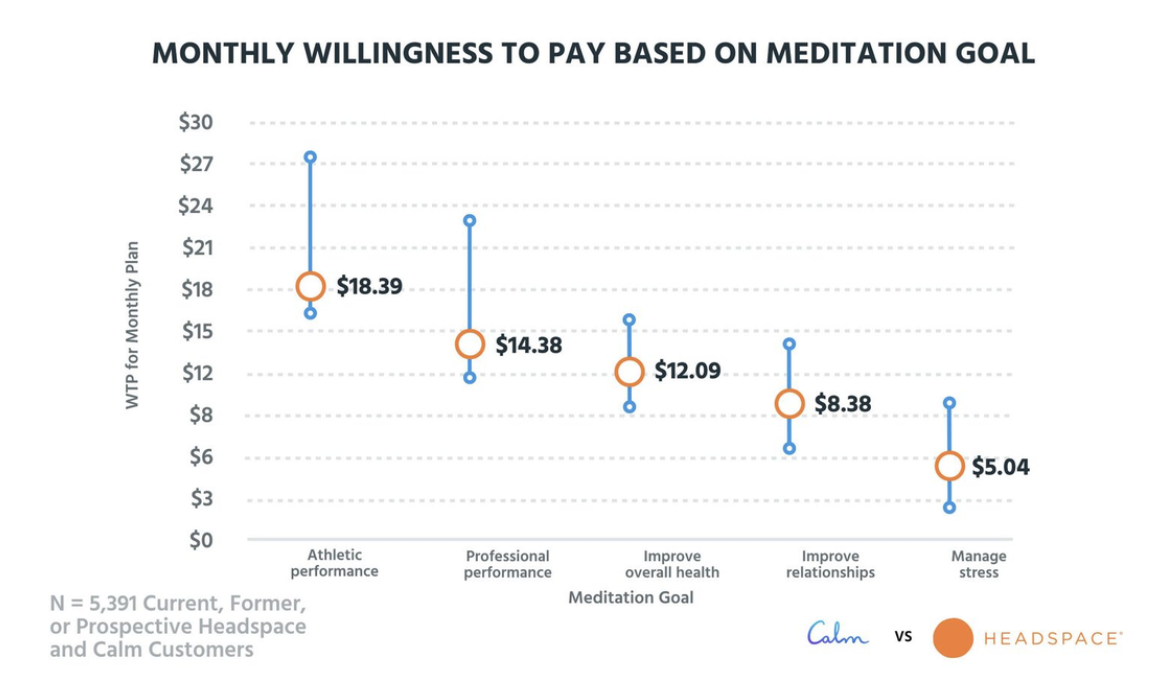
Source: https://www.profitwell.com/recur/all/headspace-calm-pricing
Scalable Wellbeing Journeys
Integrating wellness into everyday experiences
We aim to make mental wellbeing accessible to everyone. Thinkladder provides rapid Cognitive Restructuring experiences covering all areas of life, with hundreds of thousands restructuring pathways written and validated by Mental Health professionals, accelerated using our AI.
Whether via our own app or third party experiences that benefit from Thinkladder's powerful AI toolset. Thinkladder can reach broad audiences through low-cost channels (unlike generic practice-based apps and expensive bespoke services).
Adding personalized wellbeing experiences into third-party apps and websites is simple with the Thinkladder. These rapid "drop-in" integrations with other willing software applications, require as little as two lines of code.
The three key attributes for a good embedded experience archetype are:
- 1.Genuine motivation to provide a wellbeing experience for users
- 2.Structured framework with regular touch points (e.g. daily clock-in for work, a weekly student check-in, reminder to do a workout etc.)
- 3.Ability to journey with users over time (as is the case with groups like students, employees, gym members, Fitbit users etc.)
Below are some examples of integrations we have demonstrated with HR software focusing on time-and-attendance as well as our own Slack integration.
An example of Thinkladder integrated into Timecloud
Thinkladder Embedded allows Timecloud to embed a Cognitive Restructuring experience designed to help employees to adopt a more productive mindset immediately after clocking-in for work with Timecloud.

An example of Thinkladder integrated into a Wellbeing Check-in App
Thinkladder created an embedded Cognitive Restructuring experience designed to help users of this wellbeing check-in app. This allows users to immediately and rapidly explore any issues that surfaced during their wellbeing check-in and the beliefs underlying them to restructure them in the moment.

The Thinkladder Slack App is an easy to rollout wellbeing experience via Slack
The Thinkladder Slack app is designed to help people explore relevant topics and schedule encouraging messages when they are needed most. It is a lighter version of the experience available in the Thinkladder mobile app, which begins with a search or a list of Themes to discover symptoms and restructure the beliefs surrounding them with affirming 'Insights'.
The Thinkladder app is available on the App Store and Play Store, and it is easy to roll out for an organisation using emailed links or QR codes which can also deliver customised themes, contact numbers and messaging for each organisation.

The Thinkladder's AI tools deeply personalise Cognitive Restructuring pathways, and can be used to support and augment conversations that increase individual self-awareness in a healthy way.
Here is an example interaction to explore the phrase "I am a burden" from ~9,200 possible pathways.


Thinkladder scales content using a rigorous research, writing and review process expanding on data captured by Thinkladder AI and Analytics as well as workshops, pilots and third party research. We add thousands of new pathways each month as we continually add new Themes and expand existing Themes.
Sometimes there are specific shared challenges that arise for a specific organisation (for example, a natural disaster, the rising cost of living, new members etc). The Thinkladder writing team of mental wellbeing professionals can work with organisations to tailor customised Themes to help address specific challenges, and in doing so, Thinkladder covers some of the cost of adding valuable new pathways.
For example a custom Theme for a particular industry might cover topics like:
- Financial pressures of running a small business
- Dealing with an accident in the workplace
- Challenges of being a new parent
It typically takes between 4-8 weeks to deliver each new Theme via the Thinkladder app. Thinkladder can produce several new Themes in parallel.
Thinkladder can provide continuous anonymised and aggregated analytics reporting on measures to monitor wellbeing, usage patterns and concepts being explored by members of each organisation as well as recommendations for follow-up actions.
We tailor our reporting to the measurement frameworks that are relevant for each organisation. Some examples are:
- Cohort Activity Analytics;
- the ARACY Wellbeing Domains;
- a Workplace Psychosocial Hazards framework;
- a Strengths-based psychology framework; and
- Te Whare Tapa Whā.
This can help organisations to create an ongoing dialogue with their people, using familiar language, to provide targeted support for relevant issues.
Cohort Activity Report Example
Thinkladder provides an unparalleled visibility into the Limiting Beliefs within a cohort as well as supportive language in the form of Insights for use when communicating with each cohort.


Psychosocial Hazards Example:
A parent who expresses "I feel stuck at home with the kids", may experience the following psychosocial hazards:
- Low job control: The individual may feel that they have limited control over their daily routines and schedules, which can lead to a sense of being "stuck" or trapped in their current situation. They may also feel that they have limited opportunities to engage in activities outside of their caregiving responsibilities.
- Poor work-life balance: The individual may struggle to balance their caregiving responsibilities with other aspects of their life, such as work or personal hobbies. This can lead to feelings of stress, burnout, and a decline in overall well-being.
- Lack of social support: The person may feel that they lack adequate support from family, friends, or other caregivers, which can lead to feelings of isolation and loneliness.
Please note that the specific psychosocial hazards experienced by an individual who feels stuck at home with their children can vary depending on factors such as their personal circumstances, the availability of resources and support, and their coping mechanisms.
Under Australian and New Zealand law, employers have a duty of care to ensure the health and safety of their workers, so far as is reasonably practicable. This responsibility extends to the management of psychosocial hazards in the workplace. Failure to meet these obligations can lead to substantial penalties.
Safe Work Australia provides a model Code of Practice for managing work-related psychological health and safety, which provides guidance on identifying, assessing and controlling risks to psychological health in the workplace. Thinkladder Wellbeing Reporting and Compliance helps organisations to implement this framework, starting with identifying psychosocial hazards.

Identifying Psychosocial Hazards
Identifying psychosocial hazards is the first step in managing them. Psychosocial hazards may arise from the design and management of work, and the social and organisational contexts of work. They may include factors like job stress, heavy workload, bullying or harassment, and violence.
Risk Assessment, Controls & Reviews
There is no prescribed frequency for risk assessments, but regular review is recommended. If a risk is identified, it must be eliminated so far as is reasonably practicable. If it is not reasonably practicable to eliminate the risk, it must be minimised through implementing control measures and regularly reviewing their effectiveness.
Consultation with Workers
The legislation also requires that workers be consulted, so far as is reasonably practicable, when identifying hazards, making decisions about ways to eliminate or minimise those risks, deciding on the adequacy of facilities for the welfare of workers, and when proposing changes that may affect workers’ health or safety.
Training & Support
Employers are also encouraged to provide training to their employees about psychosocial hazards, how to identify them, and what to do if they encounter them. Support services such as Employee Assistance Programs (EAPs) can also be beneficial.
Reporting & Record Keeping
Employers are required to maintain records related to health and safety, including risk assessments, training, and incidents. Certain incidents must also be reported to the WHS regulator.
Pricing
Simple and predictable per-user pricing
Positioned as a platform, Thinkladder can swiftly deploy and sustain multiple business and revenue models. Below are the three models we are beach-heading with customers alongside our consumer-app model.
Our consumer-app model, running on the app stores, gives us direct access to validation with our own users as we build out the platform based models for education, therapists and embedded integrations with other providers and apps in the personal growth and development market.
Pricing for Licensed Therapists
$6 - $40 monthly per user
Therapists already use Thinkladder app with their clients. We are now offering qualified therapists access to some of our valuable internal tools powered by our data and AI to bring new insights into their practice.
Education Pricing
$20 - $50 monthly per classroom
Thinkladder is available at a discount for staff, students, families and alumni of schools and educational institutions including high-schools, vocational schools, colleges, universities and alternative education.
Thinkladder is rolled out using research pilots for lead generation where it is initially used as a wellbeing tool for staff, students and families. Our privacy-safe reporting during the pilot on student wellbeing and staff psychosocial hazards demonstrates the potential value-add to schools and educational institutions.
Volume Pricing for Thinkladder Embedded Wellbeing
Thinkladder makes it easy to embed a CBT based self-awareness experience into 3rd party platforms with as little as two lines of code. This is most suited to platforms with an engaged community focused on self-development. For example, Student wellbeing platforms, Fitbit, Calm, Strava, Les Mills etc.

Revenue & Capital Requirements
Capital Requirements
Thinkladder is raising seed funding of up to $1.9m USD which will allow Thinkladder's personalised inner-wellness tools to scale for commercial reach and transform its unique IP into a profitable business impacting millions of lives in the process.
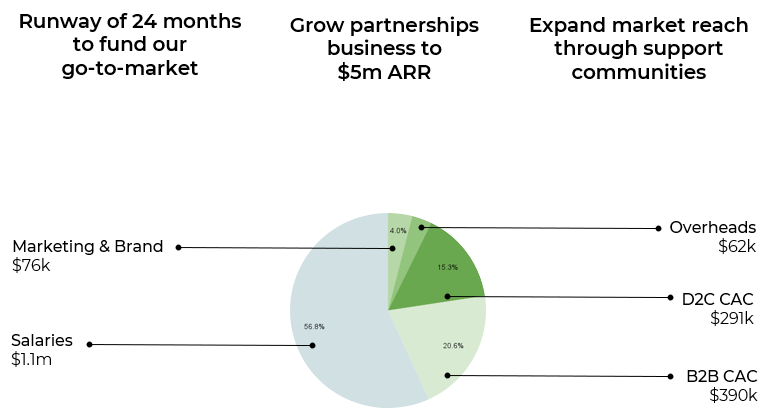
Revenue Forecast
Calm, Headspace and other wellness apps face rising lead generation and customer acquisition costs (CAC) in the range of $40-100 USD per engaged customer, which is not sustainable for Thinkladder.
Thinkladder's philosophy is to scale efficiently, partnering with platforms with an existing engaged customer base. We aim for CAC under 50c.
Thinkladder has matured and validated its API and currently generates leads through our free Slack-app. We are now partnering with self-development focused organisations to facilitate their own organic customer-led growth.

Team and Background / Privacy and Safety

As a licensed clinical psychologist, I use Thinkladder often in sessions with my therapy clients. I have found the application to be especially helpful with new clients who have yet to develop the skill of recognizing their own limiting beliefs and challenging them effectively with positive insights.
Use of the application has led to observable improvements in clients’ awareness of their automatic thoughts, helped them recognize when they are limiting, and provided reframes to utilize, decreasing stress and increasing opportunities for more positive experiences.
I will continue to recommend Thinkladder to clinicians that attend my trainings and even note that there are in-app themes that would be beneficial for providers themselves to use in times of stress.
Dr Jaimee Arnoff, Ph.D., Clinical Psychology, founder of BFF Therapy, New York is a clinical psychologist, speaker and trainer with passion for providing culturally-competent mental health services working with young clients with anxiety and depression, including those who experience suicidal ideation or urges to self-harm. She has presented at conferences, schools, and libraries, as well as spoken on radio shows and podcasts on these topics.
Founded in 2017 by Katie and Mark Gatt, the Thinkladder core team is spread across New Zealand, Australia and the U.S. and includes clinical psychologists, counsellors and therapists who contribute and validate content for the platform.
Thinkladder also draws upon a broader network of 280+ mental health professionals globally who contribute feedback into the platform.

Our primary focus is individual wellbeing and safety above all else. All our content is researched / written / edited / curated / peer-reviewed by mental health professionals. Thinkladder also recognises that individual privacy is sacrosanct. So all our analytics and reporting is very strictly anonymised and aggregated.
Thinkladder operates in a subclinical context to facilitate self-awareness around potential issues before they reach a crisis point. Thinkladder can also be used in a clinical setting with supervision by a mental health professional (contact us for more information if you are a mental health professional).
Our safety protocols are aimed at helping to identify potential escalations and empowering individuals to seek help in those instances. For schools and other organisations using Thinkladder, the escalation pathways are customised to provide the most appropriate support contacts for each individual.
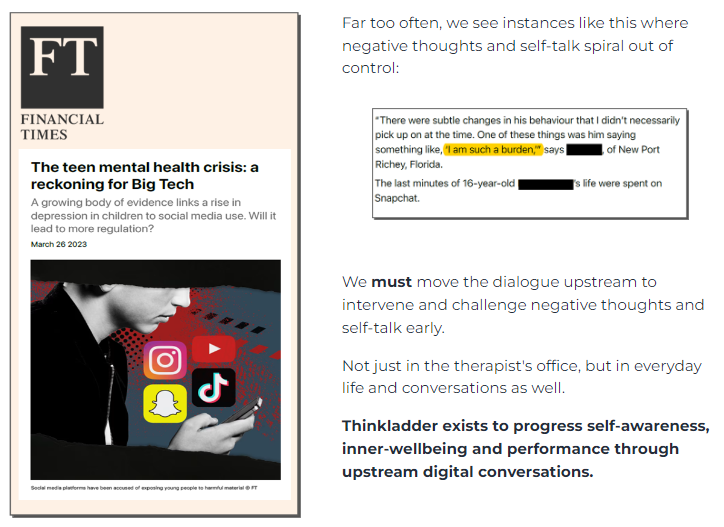
All content delivered via the app is researched / written / edited / curated / peer-reviewed by real human mental health professionals.
- We are very selective about who can access our AI tools and we use them to accelerate our content research and development processes.
- The Thinkladder AI tools are available to our own team, qualified therapists, coaches and sometimes specific research cohorts who have access for a limited time.
Over the past four years we have carried out funded research on the use of AI in a mental-wellbeing context and a key part of this is AI safety.
- Where we are satisfied that AI-powered experiences are safe for our users, we make it abundantly clear that they are interacting with AI and allow users to report any concerns.
- Our research has also enabled us to use AI to provide some of the safety features and guard-rails that operate in the background to keep users safe.
For communities and organisations with existing wellbeing support contacts, we can provide relevant contact details for your people via our app and embedded experiences.
- Some therapists use Thinkladder alongside their clients.
- Thinkladder was designed by therapists who want to:
- a.amplify their impact;
- b.serve people for whom therapy is not an option; and
- c.help their clients when they are outside the therapists office.
- Therapists also continue to share expertise and data to help us build Thinkladder.
- Thinkladder also creates a pathway for people want to seek therapy by facilitating self-awareness which helps people to prepare for deeper and more meaningful conversations with actual people.
We ask for the absolute minimum of personal details like a username and email address in order to create an account. Our research team never see these personal details. Our analytics reporting is also strictly anonymised and aggregated.
- We use trusted cloud providers (like Google, Heroku, and MixPanel) for running our services and analytics. We also don't serve ads on the Thinkladder platform and we never sell user data.
- Our analytics reporting is also strictly anonymised and aggregated - which means that when a reporting cohort is too small to effectively aggregate and anonymise data, we will require active opt-in consent from all members of a cohort before we can provide reporting to their organisation.
- The participant information sheet for discovery projects specifically addresses privacy, and if the expected cohort size for a discovery project is small, we will request the opt-in consent for providing anonymised analytics and reporting as part of participant onboarding.
The cost is circa $12,000 to produce each custom Theme that is tailored to an organisation.
- Creating new Themes involves a rigorous research, writing and peer-review process, and typically has a 4-8 week lead-time to ship a new Theme via the app.
- Thinkladder can (and does) produce multiple Themes concurrently.
Yes, we can include specific hotline numbers and link to your support resources.
- We are also happy to customise a short message on the home screen of the app.
- Furthermore, we can also customise the terms for users from your organisation if necessary.
For our small-group discovery projects and research studies, we request a list of names and contact email addresses to send project participation invitations. For broader roll-outs we will provide a QR code and a URL (which is unique to each reporting cohort in your organisation).
If you are happy to provide a list of people in your organisation who should have access, we can work with you to update the list as you need to (for example for anyone leaving/joining your organisation or anyone who moves to a new team).
